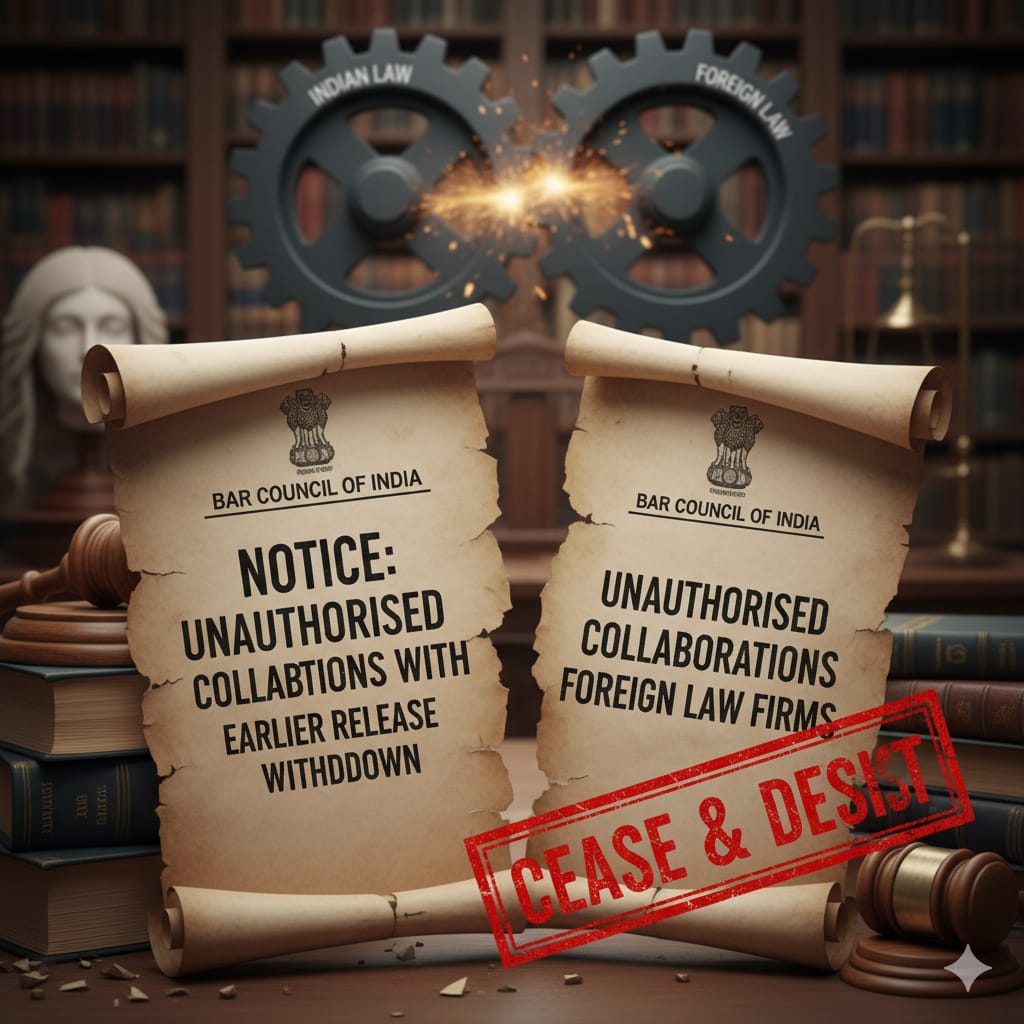“The new notice comes after a press release that named Dentons Link Legal and CMS IndusLaw as unauthorized collaborations between Indian and foreign law firms was withdrawn in August.”
Introduction
The regulatory tightrope walk for global legal partnerships in India just got more perilous. The Bar Council of India (BCI) has issued a new, strongly worded notice that reaffirms its tough stance against unauthorized collaborations, co-branding, and integrated legal platforms between Indian and foreign law firms. This decision comes after the withdrawal of a previous, more pointed press release. It shows the Council’s commitment to enforce its newly revised rules for foreign legal entities. Dated October 21, 2025, this detailed press release replaces the BCI’s controversial statement from August 5, which named specific Indian firms linked to alleged regulatory violations. This conversation follows BCI’s promise to Delhi High Court. earlier notice was contested as “prejudicial and defamatory.”
The Heart of the Debate:
The BCI’s recent move seems to be a direct reaction to what it sees as more advanced tactics for dodging existing regulations. Some foreign law firms are working in India through “back- door entry” modus operandi, the notice alleges.
The BCI describes these approaches as follows:-
Camouflaged Litigation Support: Foreign firms are believed to give complete legal strategy and drafting services on cases in Indian courts under the guise of providing only “consultancy.
Tie-ups with Indian Law Firms: They form informal, and often unregistered, “best friend” relationships or “referral arrangements” that effectively act as a single unit, with the foreign firm shaping and directing the application of Indian law.
Corporate Veil Exploitation: They use the structure of multinational corporations to place foreign legal experts in in-house legal teams. These experts then carry out tasks that are nearly the same as practicing Indian law.
“The Bar Council has been getting various requests and complaints about these unethical practices,” the notice said. “These arrangements violate the Advocates Act and pose a threat to the ethical standards and financial security of Indian lawyers.”
Mandatory Registration:
The notice clearly highlights its warning based on the Bar Council of India Rules for the Registration and Regulation of Foreign Lawyers and Foreign Law Firms in India, 2023 (with amendments made in 2025).These rules require any organization classified as an “Indian-Foreign Law Firm” to register, fully disclose their governance and structure, and comply with ethical standards before starting any activity that involves the “practice of law.”
The Council clearly reminded the profession of the restrictions placed on foreign lawyers:
Prohibition: They cannot practice Indian law in any form, directly or indirectly.
Exclusion from Courts: They are not allowed to appear before any Indian court, tribunal, or statutory authority.
Permitted Practice: Their work is strictly limited to non-litigious advisory services related to foreign law and international law, and only after formal registration or under the strictly defined ‘Fly-in, Fly-out’ provision.
“This new notice clearly shows that the BCI thinks that line is being crossed often and intentionally,”
Conclusion
This whole situation, starting with the retracted notice and ending with a firm advisory, reveals a key conflict. There is a need to welcome global investment and expertise, such as complicated cross-border transactions, and a strong desire to protect the legal market for Indian lawyers. The BCI is basically stating that they are aware of what is happening with those fancy Swiss Vereine and global brands, and they view it as unauthorized practice of Indian law. Looking ahead, the pressure is now on major international firms and their Indian partners. They can no longer stay in a regulatory grey area. They must decide whether to fully register and accept the limits set by the BCI, which means advising only on foreign law, or to break apart their ‘unified’ structures. This is not just a legal issue; it is a crucial moment that will push the industry to choose compliance and transparency over convenient uncertainty. The clock is ticking, and the BCI is serious about using its disciplinary power.
About Author:
I’m Swapnil Mishra, a student at The Legal School. I just wrapped up my Bachelor in Laws (BALLB) at LNCT University in Bhopal. I’m diving into the corporate legal world, gaining hands-on experience in contract drafting, paralegal work, and legal research. I have a real passion for Corporate and Commercial Laws, and I love exploring how legal frameworks play out in actual business scenarios. Through my writing, I aim to break down complex legal ideas, making them practical, relatable, and easy for everyone to understand.

